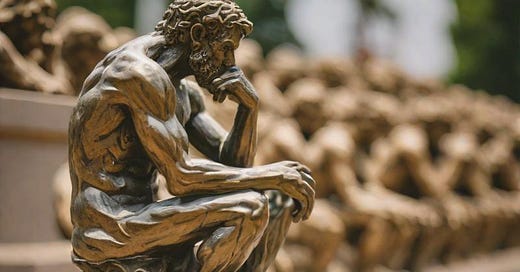Two Starter Resources on Democratic Theory
Plus a small Google Sheets + generative AI experiment
TLDR: The Stanford Encyclopedia of Philosophy’s entry on Democracy and the Oxford Bibliography entry on Democratic Theory offer oddly different histories of thinking about democracy. What gives?
Background: Regular readers of this podcast will know that I’m teaching a course this semester on democratic theory and practice. One of the most helpful resource I’ve found is Capilano University professor Michael Laurence’s Oxford Bibliography entry on Democratic Theory in the (PDF here). It covers major movements in democratic theory, including classical (Aristotle, Plato), Enlightenment Republican, Enlightenment Liberal, up through radical schools of democratic thought.
You might the Stanford Encyclopedia of Philosophy Entry’s entry on Democracy by Tom Christiano and Sameer Bajaj would cover some of the same ground. You’d be wrong! It address philosophical justifications for democracy, arguments for and against its authority, the demands of democratic participation, types of representation, “social choice” theory, and the boundary problem of who should get to participate in a democracy.
To compound things, in researching for this post, I just noticed that the Oxford Bibliography series has separate entries on democracy in its sociology and philosophy sections. I don’t have access to the sociology entry, though it seems to cover similar ground and the same authors as Laurence, with the odd sociologist thrown into the mix. The philosophy entry includes sections on voting, justice, epistemology, equality, deliberation, pragmatism, and criticisms of democracy.
Enter Generative AI, sort of: Frankly, just getting my hands on these summaries and going through the first two was exhausting. To get a sense of what was included in each, I asked Claude (a ChatGPT competitor) to generate clean citation lists from the Oxford entries, which I then put into Google Sheets to see what authors were common across all three. Below is a list of those, along with Claude-generated, offensively single-sentence descriptions of their work:
Plato - Presented influential early criticisms of democracy in the 300s BCE.
John Locke - Justified democracy instrumentally via majority rule in the 1600s [editor’s note: I would *not* pick this sentence to describe Locke’s work]
Jean-Jacques Rousseau - Linked democracy with general will in the 1700s.
John Stuart Mill - Discussed representative democracy and participation in the 1800s.
Kenneth Arrow - Formulated a mathematical impossibility theorem concerning social choices in the 1950s.
Anthony Downs - Applied economic theory to voting behavior in the 1950s.
John Dewey - Linked democracy with pragmatist philosophy in the 1950s.
Joseph Schumpeter - Advocated elite theory of democracy in the 1940s.
Robert Dahl - Analyzed democracy's critics and democratic ideals from the 1950s to 2000s.
Joshua Cohen - Developed the idea of epistemic populism in the 1980s.
Amy Gutmann and Dennis Thompson - Advocated deliberative democracy for moral disagreement in the 1990s.
Ronald Dworkin - Connected democracy with equality of resources in the 1990s.
Amartya Sen - Connected democracy with individual capability in the 1990s.
Jon Elster - Edited influential essays on deliberative democracy in the 1990s.
Tom Christiano - Defended equality in collective decision-making in the 2000s.
Elizabeth Anderson - Argued for democracy's epistemic benefits in the 2000s.
David Estlund - Defended epistemic proceduralism regarding democracy in the 2000s.
John Parkinson - Examined deliberative democracy's practical legitimacy in the 2000s.
Gerry Mackie - Systematically reviewed criticisms of democracy in the 2000s.
Jason Brennan - Critiqued uninformed voting in the 2010s.
Next Steps: Some of these authors were already on my syllabus for class this semester. Others just got themselves added! But not Kenneth Arrow. Social choice theory bores me to tears. Sorry, not sorry.




